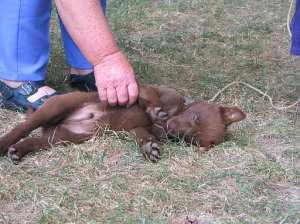Problems Common To Chihuahuas
While Chihuahuas tend to be healthy there are several Chihuahua specific health issues that you should know about before committing to one. Some of the common genetic problems include Patellar Luxuation, eye problems, hypoglycaemia, heart disease and tooth and gum ailments. Chihuahua health is a concern for all Chihuahua owners.
Luxation of the patella, is medical speak for dislocation of the kneecap. It is a common hereditary health problem with Chihuahua that is also shared with other small breeds. Patellar luxation can occur in varying degrees – it can be minimal or debilitating. Young dogs are often able to compensate for this deformity, and you may not notice your dog has knee cap problems. However, the condition gets worse over time and will become obvious as the dog ages.
Checking your Chihuahua for Luxation of the Patella – The dislocation usually occurs on the inner side of the patella (knee cap). The ligaments stretch over time until the patella is not where it is supposed to be. It then can “pop” in and out of place very easily. Treating your puppy as soon as the problem occurs can save your older Chihuahua from being crippled. Because Patellar luxation is an inherited trait dogs with the condition should not be bread.
Another common Chihuahua health is the “Reverse Sneeze.” If your Chihuahua sneezes, snorts, honks and wheezes it may well be afflicted by this deformity. The condition is caused by an elongated soft palate that becomes temporarily misaligned. This deformity is especially common in toy breeds. A reverse sneeze can occur in instances such as pulling hard on a leash, drinking too fast or getting overly excited.
Chihuahuas can also be prone to Hypoglycaemia. Hypoglycaemia is where the Chihuahua’s blood sugar level drops to an extremely low level causing “sugar shock.” When levels of glucose drop quickly, the dog’s body and brain are deprived of essential nutrients. The symptoms of Hypoglycaemia are weakness, seizures, coma, and in severe cases, death.
Chihuahuas are prone to Hypoglycaemia because they are so small. Puppies are especially prone to Hypoglycaemia. Triggers for attacks include stress, illness, lack of food, or by using up stored energy without it being replenished.
Progressive Retinal Atrophy (PRA) is another ailment Chihuahua are prone to. This is a collective term comprising a group of hereditary degenerative lesions of the retina. PRA is commonly characterized by night blindness. When both eyes are affected dogs eventually become totally blind. Central PRA (also called RPE dystrophy) is characterized by accumulations of pigment in the layer of pigmented lining of the retina which eventually results in total blindness.
Chihuahua are also genetically predisposed to Cystinuria (crystals formed out of amino acid called cystine). Traces can be found in the urine and eventually a build up will lead to stone formations in kidneys and bladder. The stones can result in irritation and infection.
Signs your Chihuahua has Cystinuria include blood in the urine, difficulty and pain in urinating, and small frequent amounts of urine. If a stone completely obstructs the urethra it prevents the passing of urine. This is more common in male dogs than female, and may cause kidney failure, vomiting, depression, or loss of appetite.
If you are looking to purchase a Chihuahua you can have a vet check for signs of many of these health problems which will save you a lot of money and heart ache down the road.


